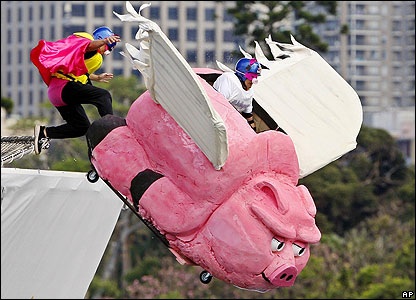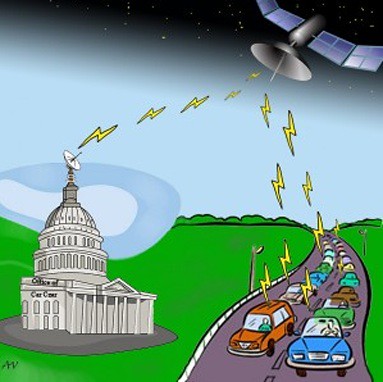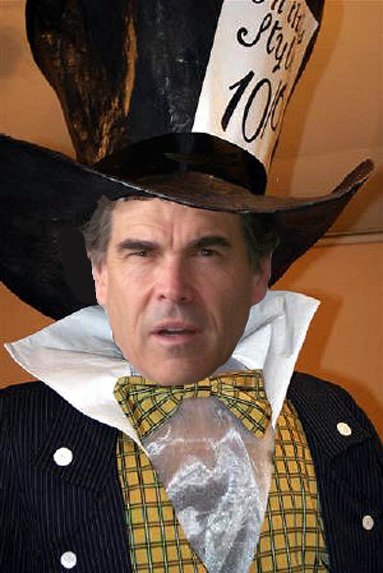The 'Macquarie Model': A ripping success for the Banksters. Not so much for the investors (think pension funds).

10/31/09
STUART WASHINGTON
The Age (Australia)
Copyright 2009
IT WAS once the flagship of Macquarie Group’s satellites, a toll-road fund that embodied the bank’s ambitions to become a globally dominant listed infrastructure funds manager.
In a flurry of transactions, Macquarie’s super-smooth bankers ranged the globe to create what Macquarie extolled as a new model, the Macquarie model, of listing infrastructure.
Yesterday, historically,Macquarie Infrastructure Group reached the end of the road at Sydney’s Westin Hotel.
Brought down by an astonishing $35 billion in debt over its road assets in North America, Europe and Australia, directors in Sydney, Britain and Bermuda agreed late on Thursday night to split MIG into separate ‘‘mature’’ and ‘‘active’’ funds.
Given that ‘‘mature’’ MIG has a debt level of 31 per cent and ‘‘active’’ MIG has a debt level of 86 per cent, the descriptions ‘‘good’’ and ‘‘bad’’ could also be used.
Pivotally, Macquarie is being kicked out as manager of good MIG, ending the Macquarie-sourced deal-making, refinancings, revaluations and fee-ripping since MIG was renamed in 2000.
While Macquarie is leaving ‘‘Good MIG’’ with a $50 million kiss-off, plus a 1 per cent advisory fee likely to be in the realm of $20 million, the exit fee pales in comparison to the hefty $345 million it stripped from Macquarie Airports on its way out.
Macquarie also remains as manager of ‘‘Bad MIG’’, with elevated base fees paid to the mothership because of the need for extra work on problem assets that include some with a 100 per cent level of debt— South Bay Expressway in the US and Warnow Tunnel in Britain.
Macquarie Bank chief executive Nicholas Moore protested yesterday that its model had been a success.
And indeed it had, for the bankers at least. For investors, however, the evidence from the past two years shows many of its major funds underperformed the S&P/ASX 200 Index (see graphic).
‘‘On the issue of the performance of the listed funds, I believe (they) will have to be judged as successful to date,’’Moore said at the bank’s interim results.
‘‘The performance of the funds— not all of them—but if you go through them one by one it has been a question of outperformance rather than underperformance.’’ But there is no doubt Macquarie is edging towards the door.
‘‘It was fun while it lasted,’’ Brett Le Mesurier, an analyst with Axiome Equities, said yesterday. It was Macquarie Infrastructure Group that made Macquarie what it is today.
No doubt, Macquarie’s stranglehold over once-public assets, with fees regularly ratcheting up on various formulas, have got up the nose of some users.
A Macquarie executive lost his job in 2003 when he crowed to investors about Britain’s M6 toll road: ‘‘We can put up the tolls by whatever we like and, almost as importantly, we can start the tolls on day one by whatever we like.’’
But the same boast helped make the toll-roads operation an investor darling, and Macquarie’s listed infrastructure fund model took off and spawned a host of imitators, including Macquarie Airports, Macquarie Media Group,Macquarie Capital Alliance Group and Macquarie Communications Infrastructure Group.
And with Macquarie Airports paying its parent $941 million since its birth in 2002, it’s little wonder Macquarie enjoyed the fees it dragged from the funds.
In late 2008, then JPMorgan banking analyst Brian Johnson found fees earned by Macquarie from its satellite business had grown from $376 million in 2002-03 to nearly $1.4 billion last financial year.
Among MIG’s heady early promises were predictability of cash flow, natural hedges against inflation from the pricing power in toll roads and the opportunity to refinance assets at more favourable rates as they entered revenue-earning phases of their development.
And the big sell for investors was a steady flow of distributions as MIG’s financial structuring of ‘‘greenfields’’ developments ‘‘brought forward’’ their distributions.
But the model carried the seeds of its own demise right from the start.
MIG’s toll-road operations never paid for itself: it was always a fiction of smart bankers being able to revalue assets, borrow more money and pay that money to investors.
Effectively, the bankers had come up with a formula for ‘‘bringing forward the cash flow’’ from infrastructure assets—and then dropping it straight into their top executives’ $30 million-plus salaries.
Anthony Kahn, a former chief executive of MIG, told BRW in 2002 that distributions to shareholders would move from payments out of capital to payments out of operations.
They never did. Not one distribution from MIG has been completely backed by operating cash flows.
Fast forward to yesterday’s annual meeting and MIG’s chairman,Mark Johnson, was promising distributions would be aligned with operating cash flows.
In practice, MIG became a spinning door that bought 33 toll roads and flogged 22 off on the way through.
Then a credit crisis made borrowing difficult, and a resulting asset deflation made revaluations for refinancing impossible.
Macquarie’s interim report revealed that since April 2007 it had made $592 million in write-downs to its listed managed funds. Its unlisted funds have fared little better, with a $410 million write-down over the same period. Now investors have had enough.
At MIG’s annual meeting yesterday chairman Mark Johnson noted the deal on good MIG removed the ‘‘external management hurdle which has existed for many institutional investors who no longer prefer that model’’.
The split of MIG puts its remaining nine roads into two separate funds: the Australian M7 Westlink and Toronto’s 407 ETR make up good MIG. The other seven—the M6, the Chicago Skyway, the Indiana Toll Road, the Dulles Greenway, APRR,Warnow Tunnel and South Bay Expressway—are bad MIG.
Johnson, a former deputy chair of Macquarie Group, provided the rationale for not only paying Macquarie, but paying it more as a percentage of assets to manage bad MIG.
‘‘Macquarie is one of the preeminent global organisations with regard to the management of infrastructure assets,’’ Johnson said.
‘‘Consequently it was a logical decision for the board that Macquarie be enlisted to help generate value for security holders.’’
(Note to board: the problems for MIG’s security holders have occurred under the watchful eye of these selfsame managers.)
MIG is the latest in a series of transactions as it substantially exits or re-structures its funds: Macquarie Capital Alliance Group via privatisation, Macquarie Leisure removing Macquarie as manager, the sale of Macquarie Communications Group, Macquarie Countrywide’s sale of US assets and Macquarie Airports punting Macquarie as manager.
On the way out, Macquarie has come under scrutiny for its exit strategy, with further related-party transactions and hefty exit fees as the funds’ boards confront costly poison pills. Macquarie sold MCAG to a related fund, collecting fees along the way.
Macquarie Countrywide sold assets, paying fees to Macquarie. Macquarie Group collected a separate fee from the buyers of Macquarie Communications Group for its management rights.
Macquarie also found itself in a storm of investor discontent when Macquarie Airports revealed it would pay a $345 million exit fee to the mothership as an exit fee.
The underperforming Macquarie Media Group also this week revealed plans to internalise its management agreement, cutting ties with the mother ship at a cost of $45 million, plus a $2.8 million advisory fee and the chance of another $11 million in management fees until the deal is finalised.
Even though a shareholder vote was all that was required, had Macquarie been removed as manager, a poison pill would have been activated in the form of a similar 1.5 per cent base fee plus a performance fee.
Yesterday MIG’s lead independent director, Paul McClintock, said the MIG transaction had been a different transaction from MAP’s exit.
He refused to comment on whether negotiations on the $50 million fee had included a demand from Macquarie to be compensated for its loss of management rights for the good MIG assets.
Johnson said that two agreements over ‘‘active’’ MIG assets would not need to be triggered because Macquarie retained management of active MIG.
Now eyes are turned towards Macquarie Group to find out how Moore intends to replace its lost revenue streams.
As noted, the stop-gap measure has been to put the squeeze on its listed funds.
Tim Buckley, head of research at Shaw Stockbroking, said Macquarie booked $414 million in fees from listed fund initiatives, including internalisation, sales and recapitalisations at Macquarie Communications Infrastructure, Macquarie Leisure and Macquarie Airports.
‘‘Clearly they’re booking significant profits at the expense of the listed vehicles that they’ve run for a long time,’’ Buckley said yesterday.
‘‘(They are) forgoing a long-term earnings stream but the reality is that it’s now history.’’ And that new reality may have some implications for shareholders in funds that, to the present time, have had Macquarie as one of their largest shareholders.
Johnson and McClintock said yesterday the MIG deal did not include any arrangement about Macquarie’s 17 per cent stake.
Buckley said Macquarie could be expected to eventually exit its stakes over time.
‘‘They’ve got $500 million in capital tied up in the vehicle . . . they recycle capital pretty aggressively,’’ Buckley said.
When those sell-downs occur, it’s vale the Macquarie Model.
© 2009 The Age: www.smh.com.au.com
To search TTC News Archives click
To view the Trans-Texas Corridor Blog click










